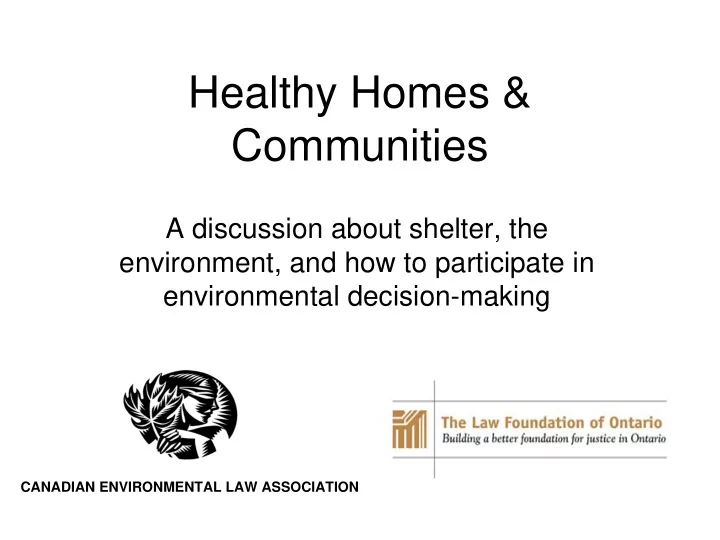

Healthy Homes & Communities A discussion about shelter, the environment, and how to participate in environmental decision-making CANADIAN ENVIRONMENTAL LAW ASSOCIATION
Introduction: The “Links” Project • “Environmental Health, Equity, and Law: Making the Links” Project being undertaken by CELA and the Environmental Health Institute of Canada • Funded by the Law Foundation of Ontario • Goal: working with six communities throughout Ontario to increase capacity of, and knowledge-exchange between, residents, legal service providers, health service providers, and others interested in environmental health issues • Input and ideas welcome regarding environmental health issues of concern in the District of Kenora and ways in which we can be of use to the local community
Shelter and the Environment: Indoor Air Quality • Air (outdoor & indoor) is the most significant media for environmental exposures • Indoor air quality is a largely unregulated source of such exposures • According to the US EPA, indoor air pollution is 1 of the top 5 environmental hazards to human health • E.g.: home, work, schools, child care, indoor recreational facilities • Note: children spend approx. 80% of their time indoors Photo: www.simpsonflint.com
Indoor Air Quality Contd. • Indoor air contaminants of concern include: – environmental tobacco smoke; – inhalable particles form combustion products; – NO2; – VOCs; – lead; and – biological allergens. • Contaminant levels in indoor dust
Indoor Air Quality Cont. • Practical tips for your home: – shoe removal; – floor cleaning; – hand washing; – smoke-free environments; – avoiding pesticides; – regular removal of house dust; – minimize carpeting or take precautionary steps with regard to it; – choosing natural, untreated materials and other low-VOC products.
Recommend
More recommend